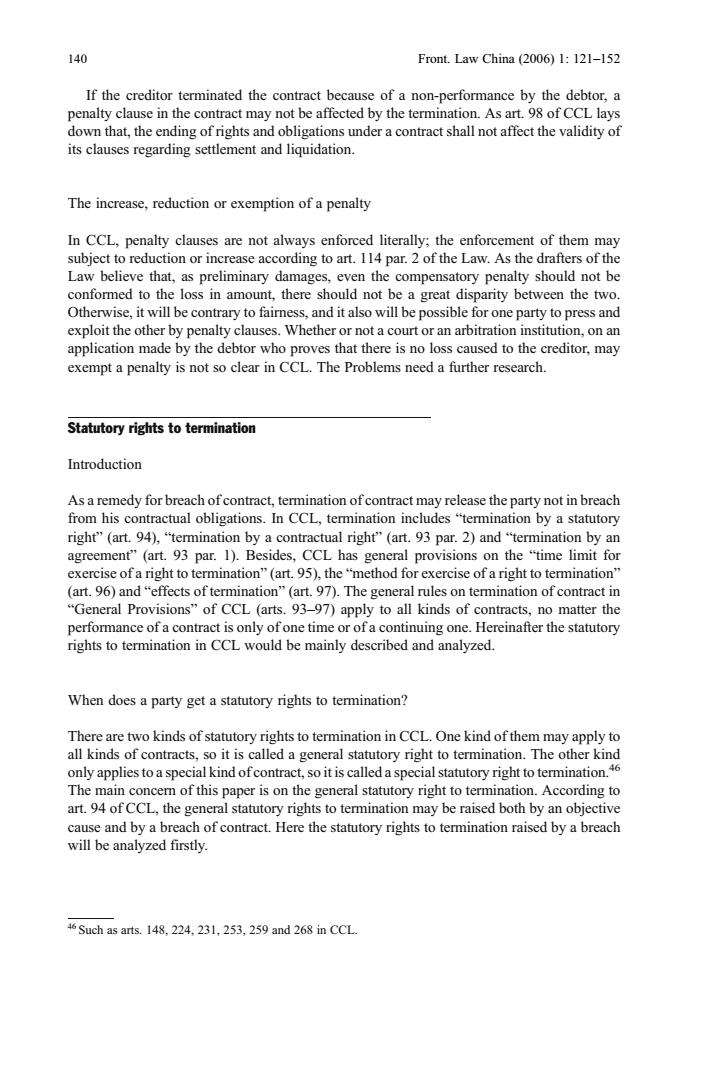正在加载图片...

140 Front.Law China(2006)1:121-152 If the creditor terminated the contract because of a non-performance by the debtor,a penalty clause in the contract may not be affected by the termination.As art.98 of CCL lays down that,the ending of rights and obligations under a contract shall not affect the validity of its clauses regarding settlement and liquidation. The increase,reduction or exemption of a penalty In CCL,penalty clauses are not always enforced literally;the enforcement of them may subject to reduction or increase according to art.114 par.2 of the Law.As the drafters of the Law believe that,as preliminary damages,even the compensatory penalty should not be conformed to the loss in amount,there should not be a great disparity between the two. Otherwise,it will be contrary to fairness,and it also will be possible for one party to press and exploit the other by penalty clauses.Whether or not a court or an arbitration institution,on an application made by the debtor who proves that there is no loss caused to the creditor,may exempt a penalty is not so clear in CCL.The Problems need a further research. Statutory rights to termination Introduction As a remedy for breach of contract,termination of contract may release the party not in breach from his contractual obligations.In CCL,termination includes "termination by a statutory right"(art.94),"termination by a contractual right"(art.93 par.2)and "termination by an agreement"(art.93 par.1).Besides,CCL has general provisions on the "time limit for exercise of a right to termination"(art.95),the "method for exercise of a right to termination" (art.96)and"effects of termination"(art.97).The general rules on termination of contract in "General Provisions"of CCL (arts.93-97)apply to all kinds of contracts,no matter the performance of a contract is only of one time or of a continuing one.Hereinafter the statutory rights to termination in CCL would be mainly described and analyzed. When does a party get a statutory rights to termination? There are two kinds of statutory rights to termination in CCL.One kind of them may apply to all kinds of contracts,so it is called a general statutory right to termination.The other kind only applies to a special kind of contract,so it is called a special statutory right to termination.46 The main concern of this paper is on the general statutory right to termination.According to art.94 of CCL,the general statutory rights to termination may be raised both by an objective cause and by a breach of contract.Here the statutory rights to termination raised by a breach will be analyzed firstly. 46 Such as arts.148,224.231,253,259 and 268 in CCL.If the creditor terminated the contract because of a non-performance by the debtor, a penalty clause in the contract may not be affected by the termination. As art. 98 of CCL lays down that, the ending of rights and obligations under a contract shall not affect the validity of its clauses regarding settlement and liquidation. The increase, reduction or exemption of a penalty In CCL, penalty clauses are not always enforced literally; the enforcement of them may subject to reduction or increase according to art. 114 par. 2 of the Law. As the drafters of the Law believe that, as preliminary damages, even the compensatory penalty should not be conformed to the loss in amount, there should not be a great disparity between the two. Otherwise, it will be contrary to fairness, and it also will be possible for one party to press and exploit the other by penalty clauses. Whether or not a court or an arbitration institution, on an application made by the debtor who proves that there is no loss caused to the creditor, may exempt a penalty is not so clear in CCL. The Problems need a further research. Statutory rights to termination Introduction As a remedy for breach of contract, termination of contract may release the party not in breach from his contractual obligations. In CCL, termination includes “termination by a statutory right” (art. 94), “termination by a contractual right” (art. 93 par. 2) and “termination by an agreement” (art. 93 par. 1). Besides, CCL has general provisions on the “time limit for exercise of a right to termination” (art. 95), the “method for exercise of a right to termination” (art. 96) and “effects of termination” (art. 97). The general rules on termination of contract in “General Provisions” of CCL (arts. 93–97) apply to all kinds of contracts, no matter the performance of a contract is only of one time or of a continuing one. Hereinafter the statutory rights to termination in CCL would be mainly described and analyzed. When does a party get a statutory rights to termination? There are two kinds of statutory rights to termination in CCL. One kind of them may apply to all kinds of contracts, so it is called a general statutory right to termination. The other kind only applies to a special kind of contract, so it is called a special statutory right to termination.46 The main concern of this paper is on the general statutory right to termination. According to art. 94 of CCL, the general statutory rights to termination may be raised both by an objective cause and by a breach of contract. Here the statutory rights to termination raised by a breach will be analyzed firstly. 46 Such as arts. 148, 224, 231, 253, 259 and 268 in CCL. 140 Front. Law China (2006) 1: 121–152